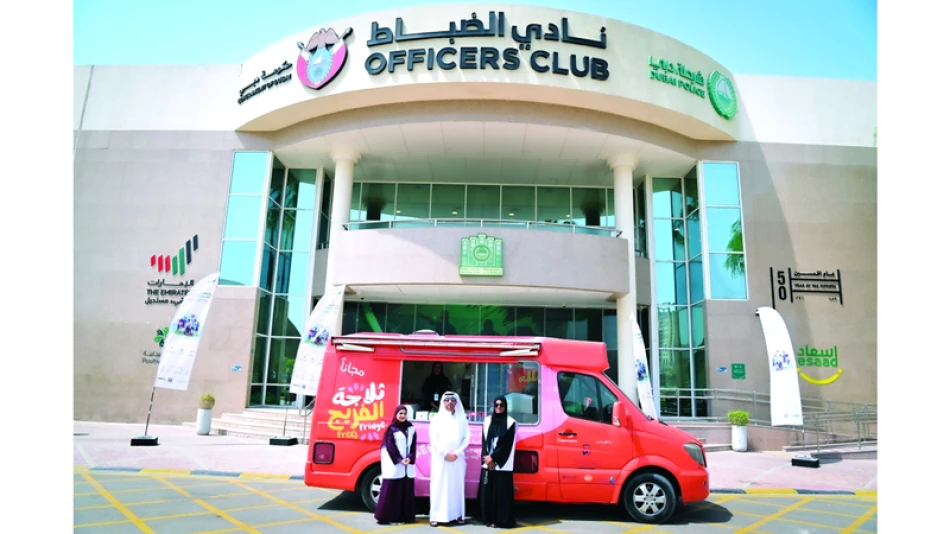
Dubai Police Backs 'Fereej Refrigerator' Initiative to Help Needy Residents
Dubai Police Join Community-Driven Summer Relief Campaign for Workers
Dubai Police's General Command has partnered with a grassroots humanitarian initiative to distribute two million bottles of cold water, juices, and ice pops to workers across Dubai during the scorching summer months. The "Neighborhood Fridge" campaign represents a growing trend of public-private partnerships in the UAE aimed at supporting the emirate's essential workforce while temperatures soar above 40°C.
A Model for Corporate Social Responsibility
The second edition of the "Neighborhood Fridge" campaign, launched by Farjan Dubai with backing from the Mohammed bin Rashid Al Maktoum Global Initiatives Foundation, demonstrates how community-driven social programs are evolving beyond traditional charity models. The initiative operates through strategic partnerships with Saqia UAE and the UAE Food Bank, creating a comprehensive support network.
Brigadier Ali Khalfan Al Mansouri, Director of the General Administration for Community Happiness at Dubai Police, emphasized that the campaign "presented an innovative and inspiring model that transcends traditional concepts of community work." His participation signals a broader institutional commitment to worker welfare that extends beyond regulatory compliance.
Strategic Community Engagement
Dubai Police's involvement reflects a calculated approach to community policing that builds trust through direct service delivery. By participating in worker relief efforts, the force strengthens relationships with Dubai's diverse labor community while reinforcing the UAE's image as a caring employer destination.
Addressing Critical Infrastructure Needs
The campaign targets a fundamental challenge facing Gulf states: maintaining worker productivity and safety during extreme summer conditions. With construction and outdoor work continuing year-round in Dubai's rapid development cycle, heat-related health risks pose both humanitarian and economic concerns.
Alia Al Shamlan, Director of Farjan Dubai, noted the campaign's "unprecedented response and community partnerships," suggesting that worker welfare initiatives are gaining traction among Dubai residents. This grassroots engagement indicates a maturing civil society that takes ownership of social challenges rather than leaving them entirely to government agencies.
Economic Implications
The initiative's success could influence labor market dynamics in the UAE. Countries competing for migrant workers—including Saudi Arabia and Qatar—are increasingly evaluated on working conditions and social support systems. Dubai's community-driven approach to worker welfare may provide a competitive advantage in attracting quality labor for ongoing mega-projects.
Scaling Social Innovation
The campaign's expansion from its first edition demonstrates scalability potential that could be replicated across other emirates or exported to similar climates. The two million bottle target represents significant logistical coordination, suggesting robust organizational capabilities behind the initiative.
Farjan Dubai, the campaign's primary organizer, positions itself as a social enterprise focused on empowering local communities in residential neighborhoods. This model bridges the gap between government services and private sector resources, creating sustainable funding mechanisms for ongoing social programs.
Regional Context
The UAE's approach contrasts with purely government-led worker protection programs in other Gulf states. By fostering community ownership of worker welfare, Dubai may be creating more resilient and responsive support systems that adapt to local needs rather than relying solely on top-down mandates.
Long-term Strategic Value
Beyond immediate heat relief, the campaign serves Dubai's broader economic strategy of maintaining its reputation as a business-friendly destination with strong social infrastructure. International companies increasingly factor worker welfare and community support into location decisions, making such initiatives valuable for economic competitiveness.
The partnership model demonstrated here—combining police engagement, foundation support, and community participation—offers a template for addressing other urban challenges in rapidly growing cities. As Dubai continues expanding its population and infrastructure, scalable community engagement mechanisms become increasingly valuable for social cohesion and economic stability.
Most Viewed News

 Sara Khaled
Sara Khaled






